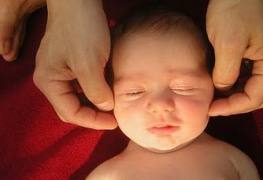Benefits of Infant Massage
TO THE BABY (PSYCHOLOGICAL):
TO THE BABY (PHYSIOLOGICAL):
TO THE PARENT/GIVER:
- Increases sense of being loved and accepted, and helps baby learn to trust its parents
- Improves body awareness as the infant learns through touch how their body is constructed, and where body parts are in relation to one another
- Teaches children appropriate touch and the option of refusing touch as they grow
- Increases self-esteem. Ashley Montague, an anthropologist, makes the assertion that a child’s self esteem is increased based on a close relationship with its parents
- Enhances relaxation
TO THE BABY (PHYSIOLOGICAL):
- Releases stress, which reduces the estimated 60–90% of illnesses attributed to stress
- Stimulates circulation, which improves oxygen and nutrient flow to the cells and enhances removal of toxins from the cells
- Strengthens digestion by stimulating the vagus nerve which assists peristalsis
- Strengthens circulatory, and intestinal systems
- Strengthens the immune system by stimulating lymph flow and by increasing natural killer cells (white blood cells that kill many types of tumor cells), which can positively impact children suffering from immune disorders or cancer
- Deepens respiration, allowing asthmatic children to breath better
- Reduces discomfort from colic, gas, constipation, teething, congestion, sinus congestion (see specifics on these conditions further into this manual)
- Develops and improves muscle tone
- Improves sleeping patterns, deepening sleep and sometimes contributing to longer periods of sleep
- Speeds myelination (development of the myelin sheath that increases impulse transmissions) of the brain and nervous system, stimulates right/left brain development and coordination
- Enhances neurological development by balancing the stimulation of massage with relaxation, which promotes the production of a hormone from the pituitary gland (ACTH), which leads to the growth of neuron connections
- Helps to develop coordination by encouraging midline orientation and using opposite limbs in rhythm
TO THE PARENT/GIVER:
- Improves relaxation, reduces stress
- Promotes parenting skills, by increasing confidence by enhancing their baby’s health and development, and giving them methods to relax the baby if it becomes stressed
- Provides quality bonding time for both parent and child
- Increases “communication” between baby and parent and allows parent to better read babies’ cries and vocalizations
- Makes for a calmer, happier baby, which makes for a calmer, happier family
- Increases parent’s awareness of their baby’s physical condition, so they are more in tune to any abnormal lumps or conditions they might not have felt otherwise

